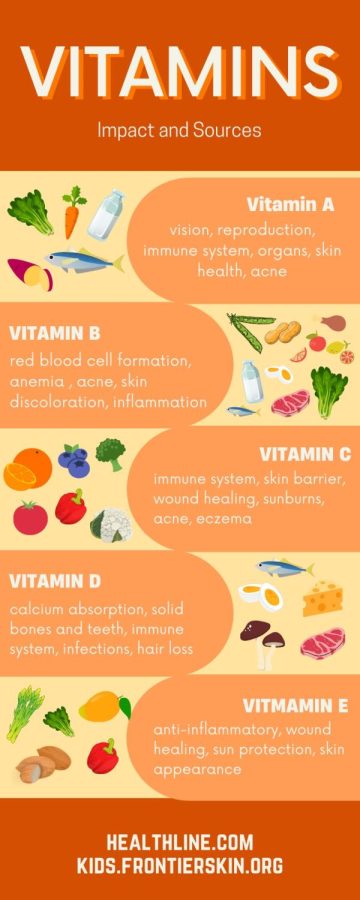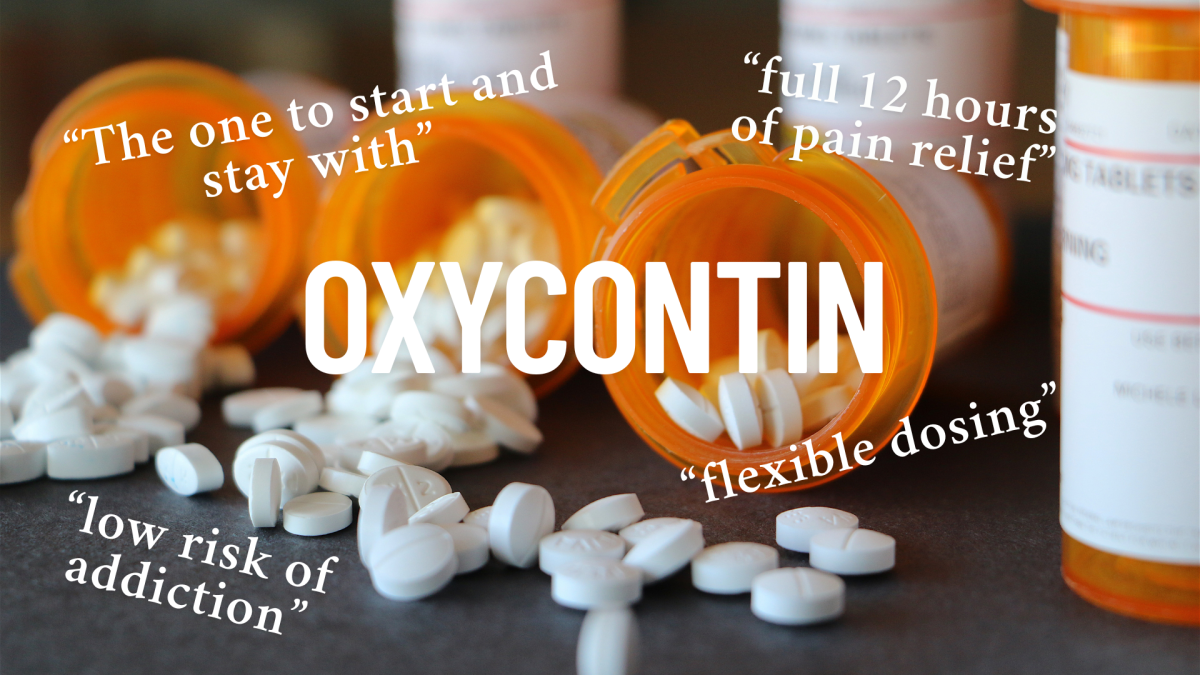A variety of vitamins: a guide to the essential nutrients needed to maintain internal health
Vitamins come in five different types, all corresponding to the first five letters of the alphabet.
May 19, 2022
Cleansers, toners, and lotions of all kinds are sweeping the beauty industry, but what goes inside the body is just as important as what goes on the outside. When your diet lacks nutrients, the skin’s ability to protect against acne and other diseases and disorders is hindered.
“To perform its important functions, the skin and nails depend on nutrients from the foods we eat, including vitamins A, B, C, D, and E, protein, and essential fatty acids,” said assistant professor of dermatology Jillian M. Richmond from kids.frontierskin.org.
Poor skin health is not only observable in breakouts, and solutions cannot only be found in the beauty section.
“Some general signs [of poor skin health] include redness, pain, swelling, rashes, and delayed wound healing or improper scar formation. Eating foods that are rich in vitamins, taking vitamin supplements, or using products such as vitamin E oil on the skin can help treat these problems,” said Richmond.
Vitamin A
Dairy, carrots, fish, leafy green vegetables, and orange sweet potatoes are all rich in vitamin A which plays an important role in skin health maintenance when weak, old skin cells shed.
It can also treat eczema, a condition in which the skin is chronically inflamed and itchy. Some studies have even suggested that vitamin A intake is associated with a reduction in the risk of skin cancer.
“Vitamin A is directly absorbed by the small intestines and stored primarily in the liver. Therefore, patients with diseases of the liver and small intestines are at risk of vitamin A deficiency, as are people who do not eat enough foods that are rich in vitamin A,” said Richmond.
A deficiency in this vitamin is observable via dry mouth, dry skin, dry eyes, and rough skin on one’s arms and legs.
Vitamin B
Green leafy vegetables, whole grains, legumes, fruits, milk, seeds, nuts, eggs, red meat, poultry, and fish are highly sufficient in vitamin B which plays a significant role in skin cell growth. B vitamins have a range that affects what they can help with: B1, B2, B3, B5, B6, B7, B9, and B12.
“People with discolored patches on their skin, acne, redness, inflammation of the skin, and infections may benefit from B vitamins. Some studies have suggested an association between B vitamins and a reduction in a person’s risk of skin cancer,” said Richmond.
Vitamin B can present itself as dry mouth, dry scaly skin, coiled hair, and brittle nails.
Vitamin C
Citrus fruits, broccoli, berries, tomatoes, peppers, and cauliflower have a lot of vitamin C, an essential vitamin for aiding many of the body’s chemical reactions.
“It boosts the immune system and supports the skin’s barrier function. Vitamin C is necessary for wound healing and protects the skin from sunburns,” said Richmond.
This vitamin improves various skin conditions, including acne and eczema. A deficiency might manifest as bleeding around the hair follicles, easy bruising, gum bleeding, delayed wound healing, coiled hair, and an increased risk of infection.
Vitamin D
Cheese, red meat, oily fish, eggs, and mushrooms have high levels of vitamin D. Ultimately, it is primarily obtained from the sun, but people living in areas with less sunlight or those sensitive to it can be affected by a deficiency.
“Vitamin D helps our bodies absorb calcium and promotes solid bones and teeth. It also supports the immune system and protects the body’s cells from being attacked by its own immune cells,” said Richmond.
Other pluses include improved wound healing and the prevention of skin cancer, acne, infections, and hair loss.
Vitamin E
Mangoes, asparagus, green vegetables, red bell peppers, and almonds have a lot of vitamin E. This vitamin enhances skin texture and maintains brain function and the immune system.
“It has anti-inflammatory properties and is helpful during wound healing. It helps to protect the skin from sun damage, environmental pollutants, and certain drugs. Studies show that vitamin E is effective in preventing skin cancer, yellow nails, and ulcers,” said Richmond.
A deficiency is visible in dull, dry skin or wrinkles and sensation loss in toes and fingers. A diet rich in vitamin E improves wound healing and the skin’s general appearance. Lotions and ointments fortified with this vitamin are common.





